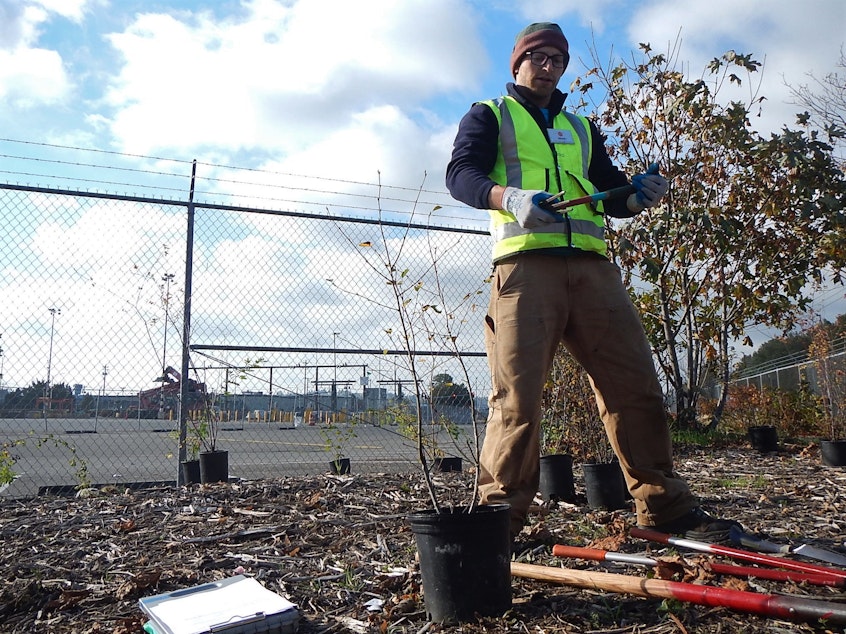Seattle’s public health enemy #1? Climate change

Climate change is the number-one threat to the health of the Seattle area, according to the region’s top public health officer.
Serious local impacts are expected to include choking forest fire smoke, toxic algae blooms and disease outbreaks --- and the toll on mental health when the less-than-natural disasters start to pile up.
“All of these effects we're already seeing,” said Jeff Duchin, health officer for Public Health — Seattle & King County. “But they're going to be unimaginably worse if we don't successfully reverse our excess greenhouse gas emissions.”
Polar bears and coral reefs often serve as poster children for global warming, but scientists say human health has also started to suffer as our climate has changed, both in Seattle as well as in warmer parts of the world.
The Mosquito Coast
On the Tacoma waterfront, before a group of volunteers dug in to restore a tiny salt marsh with native plants, Sean Walters with Earthcorps gave a safety talk.
Sponsored
“How many feet do we use on a shovel at one time?” Walters asked as he demonstrated the garden tools they’d be using that day. “One. It's not a pogo stick.”
His safety talk also included a less-obvious risk: a disease that is almost unknown in western Washington.
“We have some mosquito repellent,” Walters said to the volunteers gathered at the marsh’s edge. “There was an advisory that at one of our Green Tacoma sites, the Gog-le-hi-te wetlands, there was West Nile virus detected.”
Tacoma-Pierce County health officials found West Nile virus in mosquitoes at Tacoma’s Gog-le-hi-te wetlands in August. It was the first such discovery in Washington west of the Cascades.
A Seattle woman in her 40s was hospitalized in September with the first locally acquired case of West Nile virus.
Sponsored
Budget cuts led King County to end its surveillance for the virus in mosquitoes in in 2009. Surveillance in birds ended statewide in 2016.
Public health experts said it’s difficult to know whether these two occurrences were flukes or part of a larger, climate-driven pattern. But scientists know that West Nile virus and the mosquitoes that carry it thrive in warmer temperatures.
“When a mosquito takes a blood meal, it’s not immediately infectious,” said geographer and entomologist Cory Morin with the University of Washington. “It takes time for the virus to incubate in the mosquito. Generally that period is longer at lower temperatures.”
“We know that the insects that spread West Nile virus are responsive to changing environmental conditions,” Duchin said. “We expect the risk of exposure to increase nationally.”
Sponsored
Tip of the melting iceberg
Scientists say we should expect diseases to pop up where they haven’t before as our climate heats up. Yet disease outbreaks are just the tip of the melting iceberg.
A changing climate will also fuel extreme weather extremes, from heavy storms that drive flooding to heat waves that could threaten farmworkers and others who work outside.
Effects can be less direct, too: Higher levels of carbon dioxide are also reducing nutrient levels of some crops and harming fisheries.
Warmer oceans spur harmful algae blooms that turn shellfish toxic. After a major algal bloom scared people away from tourism-dependent Long Beach, Washington, in 2016, the local food bank recorded an almost 25 percent jump in the number of families seeking assistance over the next six months, according to the federal government’s recent National Climate Assessment.
“The form and pace of the world's response to climate change will shape the health of nations for centuries to come,” a special report by the medical journal The Lancet concluded in November.
Sponsored
All in all, according to Duchin, climate change is big enough to overwhelm healthcare systems if we don’t get it under control.
The World Health Organization estimates that rapid reductions in carbon pollution would save more than a million lives a year by mid-century.




